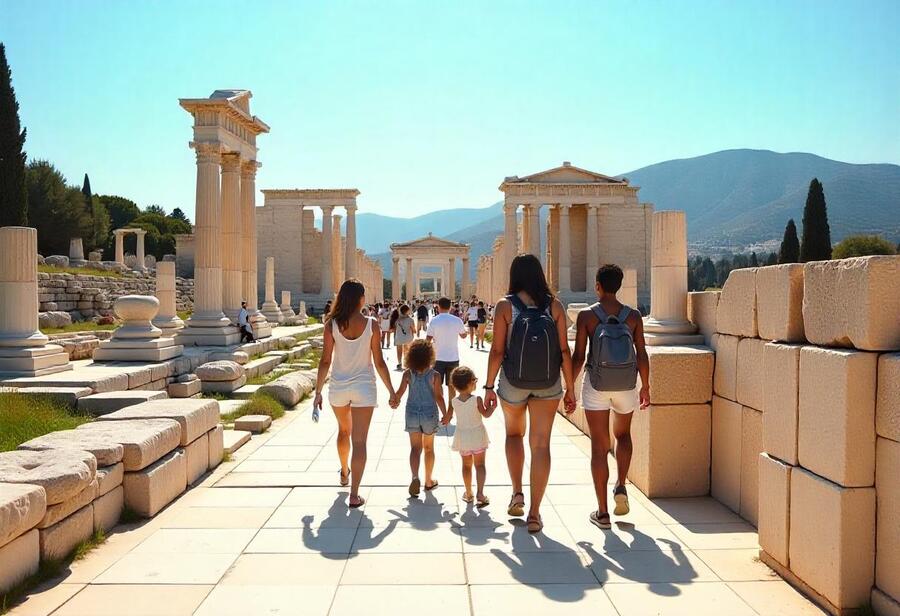≡-Greece Continues to Attract Global Tourists for Relaxation, Culture, and Entertainment, with U.S. Tourists Leading the Charge for Nightlife, Theme Parks, and Live Music: Latest Update – Viral of Today
<> Viral of Today <>
Home » Greece » Greece Travel News » Greece Continues to Attract Global Tourists for Relaxation, Culture, and Entertainment, with U.S. Tourists Leading the Charge for Nightlife, Theme Parks, and Live Music: Latest Update Tuesday, June 24, 2025A recent Visa-Ipsos survey conducted with 1,500 travelers from the U.S., U.K., and France has provided a fascinating insight into the evolving travel trends and preferences of those planning trips to Greece in 2025. As Greece continues to be a popular destination for international tourists, the survey has revealed important shifts in travelers’ booking behaviors, destination choices, spending habits, and even their growing interest in new tools like AI-driven chat platforms for trip planning.Spending Patterns: Americans Lead the PackFor American tourists, Greece is not just a holiday destination but a significant expenditure. On average, U.S. visitors are expected to spend nearly $3,500 (€3,040) per person on their trip to Greece, which accounts for about 13 percent of their annual income. This hefty travel budget reflects the strong appeal of Greece as a prime European destination for Americans. However, the spending habits vary significantly, with some travelers allocating much higher budgets for exclusive experiences. Around 21 percent of U.S. visitors are preparing to spend over $20,660 (€18,000) per person, budgeting for high-end experiences such as private guided tours, luxury accommodations, and gourmet dining, all indicative of a trend toward premium travel in Greece.The trend of spending big isn’t exclusive to the U.S. market. Travelers from the U.K. and France, while spending somewhat less, also report similar inclinations towards luxury and experiential travel. The survey also highlights the economic impact that international visitors will have on Greece’s tourism industry, with millions of dollars in spending expected in the coming months.Booking Behavior: Last-Minute Travel on the RiseOne of the more intriguing findings from the survey is the growing tendency among U.S., U.K., and French travelers to book their holidays at the last minute. In fact, 90 percent of respondents from these countries revealed they typically finalize their holiday plans less than one month before departure. This last-minute booking behavior can be attributed to several factors, including the desire for flexibility around personal schedules and the need to keep an eye on fluctuating prices. The high levels of uncertainty around travel dates and accommodations have become a defining feature of the modern travel experience.Moreover, this behavior is driven by travelers’ desire to monitor price changes and take advantage of any last-minute deals that may emerge. Travelers also tend to book closer to departure to avoid the intense summer heatwaves that can affect Greece, especially in the peak months of July and August. The survey results suggest that many people prefer to travel when the temperatures are milder, and booking closer to departure allows them to make better-informed decisions regarding weather conditions.The Rise of AI: ChatGPT Takes the SpotlightWhile traditional sources of information such as travel agencies, guidebooks, and word-of-mouth recommendations have long played an integral role in the travel decision-making process, there is a new tool gaining traction among travelers: artificial intelligence. The survey revealed that an increasing number of travelers are turning to AI-driven platforms like ChatGPT for trip planning advice. This marks a significant shift in how people approach the planning of their vacations, with many travelers now consulting AI to answer specific questions about destinations, accommodation options, activities, and even the best times to visit.The role of AI in trip planning is expected to expand further in the coming years, offering travelers personalized recommendations based on their preferences and budgets. This trend reflects a broader global shift toward using technology and data to streamline travel planning and enhance the overall customer experience. By turning to AI tools, travelers are able to access real-time information, tailored suggestions, and a more interactive approach to planning their trips.Preferred Travel Months and DestinationsFor American tourists, July is expected to be the peak month for traveling to Greece. This aligns with the school holiday schedule and the general trend of family vacations during the summer months. In terms of preferred destinations within Greece, Athens and the Attica region dominate, with 41 percent of U.S. visitors planning to visit these iconic locations. The rich historical and cultural offerings of Athens, including the Acropolis and ancient ruins, continue to attract a large number of visitors each year.In addition to Athens, the South Aegean (31 percent) and Crete (27 percent) are also among the top choices for American travelers. The South Aegean offers a blend of beautiful islands, crystal-clear waters, and picturesque villages, while Crete attracts tourists with its blend of history, natural beauty, and vibrant culture. Other regions of Greece, including Thessaloniki and the Peloponnese, are also gaining in popularity, though they are less frequented by Americans compared to the more established destinations.Duration of Stay: Short Getaways vs. Extended VacationsWhen it comes to the length of stay, the survey found that travelers from the U.S., U.K., and France are divided. Approximately 50 percent of respondents from all three countries intend to stay in Greece for 4 to 7 days. This shorter duration is often favored by travelers looking for a quick getaway. However, the other half of respondents are planning longer trips, ranging from eight nights to several weeks. The longer stays reflect an increasing interest in exploring Greece in greater depth, with travelers choosing to immerse themselves in Greek culture, history, and natural beauty for a more extended period.Why Greece: Beaches, Archaeology, and MoreThe primary reasons for choosing Greece as a travel destination were clear. The allure of its beautiful beaches was the most frequently cited reason, with 69 percent of travelers selecting this as a key factor in their decision. Greece’s beaches are renowned for their crystal-clear waters, golden sands, and idyllic island settings, making them perfect for relaxation and beach vacations.In addition to beaches, Greece’s rich archaeological heritage is another major draw. About 65 percent of respondents mentioned the country’s ancient ruins and historical landmarks as a key factor in their decision to visit. From the Acropolis in Athens to the Palace of Knossos in Crete, Greece is home to some of the world’s most famous archaeological sites.However, American tourists, in particular, showed a greater interest in Greece’s nightlife, theme parks, and live music, reflecting a broader trend toward blending relaxation with entertainment and cultural activities. This interest in entertainment options is seen as a contrast to the more cultural and historical interests of British and French travelers.Environmental Concerns and SustainabilityEnvironmental sustainability is also a key factor for many travelers, particularly those from the U.S. The survey found that 30 percent of American travelers are willing to pay an additional 5 to 10 percent for eco-friendly travel options in Greece. This willingness to support more sustainable tourism practices is indicative of a growing trend toward responsible travel and a desire to minimize the environmental impact of vacations.Multi-Destination Travel: Greece as Part of a Larger ItineraryAn interesting trend observed in the survey is that many travelers to Greece are combining their trip with visits to other European destinations. Approximately 50 percent of visitors to Greece also plan to visit Italy, while 40 percent are considering Spain as part of their multi-destination itineraries. This reflects the increasing popularity of multi-country European vacations, where travelers can explore several destinations within close proximity, making the most of their travel time and experiences.ConclusionThe Visa-Ipsos survey offers valuable insights into the evolving travel preferences of visitors to Greece, highlighting a growing trend of last-minute bookings, a shift toward luxury and experiential travel, and the increased use of technology like ChatGPT for trip planning. Greece’s stunning beaches, rich history, and vibrant culture continue to attract international travelers, with American visitors particularly keen on combining relaxation with entertainment. Environmental concerns are also becoming more significant, with travelers expressing a willingness to invest in eco-friendly options. As Greece remains one of Europe’s top destinations, its role in multi-destination trips is expected to increase, further boosting its status as a global tourism hub.Tags: ChatGPT, eco-friendly travel, French travelers, greece, Greek destinations, luxury travel, summer vacations, Tourism Insights, travel planning, travel trends, U.K. travelers, U.S. Travelers
This information will surprise you!
See also
- Read until the end to discover everything.
- Important information you need to know.
- Interesting facts and helpful tips.
Conclusion
Did you enjoy the news? Keep following us daily!













